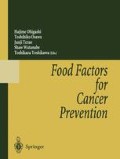Summary
Epidemiological observations indicate that Japanese male smokers are at a lower risk of the smoking-related lung cancer than male smokers in the United States. Dietary factors may contribute to the difference. We hypothesize that consumption of green tea containing the antioxidant polyphenols is protective against lung cancer. Our animal bioassay in A/J mice showed that mice administered the tobacco nitrosamine 4-(methylnitrosamino)-1-(3-pyridyl)-1-butanone (NNK) developed significantly fewer lung tumors when given green tea or its major polyphenol epigallocatechin gallate (EGCG) in drinking water than the NNK-treated mice that drank water. Caffeine given in drinking water also inhibited lung tumor formation in the NNK-treated mice, although the extent of inhibition was small. Studies showed that green tea and EGCG suppressed the formation of 8-hydroxydeoxyguanosine (8-OHdG), a marker of oxidative DNA damage, in the lung DNA of mice treated with NNK. These results suggest that inhibition of lung tumorigenesis by green tea may be attributed to its antioxidant activity. Other prevalent tobacco and environmental carcinogens, such as benzo(a)pyrene (BaP) and N-nitrosodimethylamine (NDMA), also induced 8-OHdG levels in the lung DNA of mice. These results provide a rationale for studying green tea as a potential inhibitor of lung tumorigenesis induced by BaP and NDMA.
Access this chapter
Tax calculation will be finalised at checkout
Purchases are for personal use only
Preview
Unable to display preview. Download preview PDF.
References
Hirayama T (1990) Life style and mortality: a large-scale census-based cohort study in Japan—contributions to epidemiology and biostatistics. Karger, Basel, 1–138
US Department of Health and Human Services (1982) The health consequences of smoking: cancer. A report of the Surgeon General. US Department of Health and Human Services, Public Health Service, Centers for Disease Control, Center for Chronic Disease Prevention and Health Promotion, Office on Smoking and Health, Rockville, MD, Publ PHS 82–50179, pp 1–322
Wynder EL, Fujita Y, Harris RE, Takeshi H, Hiyama T (1990) Comparative epidemiology of cancer between the United States and Japan: a second look. In: Sasaki R, Aoki K (eds) Comparative study of etiology and prevention of cancer, University of Nagoya Press, Nagoya, Japan, pp 103–127
Kada T, Kaneko K, Matsuzaki S, Matsuzaki T, Hara Y (1985) Detection and chemical identification of natural bio-antimutagens, a case of the green tea factor. Mutat Res 80:503–505
Fujita Y, Yamane T, Tanaka M, Kuwata K, Okuzumi J, Takahashi T, Fujiki H, Okuda T (1989) Inhibitory effect of (−)-epigallocatechin gallate on carcinogenesis with N-ethyl-N′-nitro-N-nitrosoguanidine in mouse duodenum. Jpn J Cancer Res 80:503–505
Xu Y, Ho C-T, Amin SG, Han C, Chung F-L (1992) Inhibition of tobacco-specific nitrosamine-induced lung tumorigenesis in A/J mice by green tea and its major polyphenol as oxidants. Cancer Res 52:3875–3879
VanderPloeg LVC, Wolfrom DM, Welsch CW (1991) Influence of caffeine on development of benign and carcinomatous mammary gland tumors in female rat treated with the carcinogens 7,12-dimethylbenz(a)anthracene and N-methyl-N-nitrosourea. Cancer Res 51:3399–3404
Peterson LA, Hecht SS (1991) O6-Methylguanine is a critical determinant of 4-(mefhylnitrosamino)-l-(3-pyridyl)-l-butanone tumorigenesis in A/J mouse lung. Cancer Res 51:5557–5564
Devereux TR, Anderson MW, Belinsky SA (1991) Role of ras proto-oncogene activation in the formation of spontaneous and nitrosamine-induced lung tumors in the resistant C3H mouse. Carcinogenesis 12:299–303
Shi ST, Wang Zhi-Y, Smith TJ, Hong Jun-Y, Chen W-F, Ho C-T, Yang CS (1994) Effects of green tea and black tea on 4-(methylnitrosamino)-l-(3-pyridyl)-l-butanone bioactivation, DNA methylation, and lung tumorigenesis in A/J mice. Cancer Res 54:4641–4647
Osawa T, Namiki M, Kawakishi S (1990) Role of dietary antioxidants in protection against oxidative damage. Basic Life Sci 52:139–153
Srinivasan S, Glauert H (1990) Formation of 5-hydroxy-methyl-2’-deoxuridine in hepatic DNA of rats treated with γ-irradiation, diethylnitrosamine-2-acetyl-aminofluorene or the peroxisome proliferator ciprofibrate. Carcinogenesis 11:2021–2024
Ahotupa MJ-C, Brereziat V, Bussacchini-Griot AMC, Bartsch H (1987) Lipid peroxidation induced by N-nitrosodimethylamine (NDMA) in rats in vivo and in isolated hepatocytes. Free Radical Res Commun 3:285–291
Chung F-L, Xu Y (1992) Increased 8-oxodeoxyguanosine levels in lung DNA of A/J mice and F344 rats treated with the tobacco-specific nitrosamines 4-(methylnitrosamine)-l-(3-pyridyl)-l-butanone. Carcinogenesis 13:1269–1272
Frenkel K (1992) Carcinogen-mediated oxidant formation and oxidative DNA damage. Pharmacol Ther 53:127–166
Namekata T, Shimizu Y, Kushi L (1992) Dietary antioxidants and the risk of lung cancer and dietary cholesterol and incidence of lung cancer: The western electric study. Am J of Epidemio 136:1167–1169
Author information
Authors and Affiliations
Editor information
Editors and Affiliations
Rights and permissions
Copyright information
© 1997 Springer Japan
About this paper
Cite this paper
Chung, FL., Xu, Y., Jin, CL., Wang, M. (1997). Tea as Antioxidant in Prevention of Lung Cancer. In: Ohigashi, H., Osawa, T., Terao, J., Watanabe, S., Yoshikawa, T. (eds) Food Factors for Cancer Prevention. Springer, Tokyo. https://doi.org/10.1007/978-4-431-67017-9_25
Download citation
DOI: https://doi.org/10.1007/978-4-431-67017-9_25
Publisher Name: Springer, Tokyo
Print ISBN: 978-4-431-67019-3
Online ISBN: 978-4-431-67017-9
eBook Packages: Springer Book Archive

